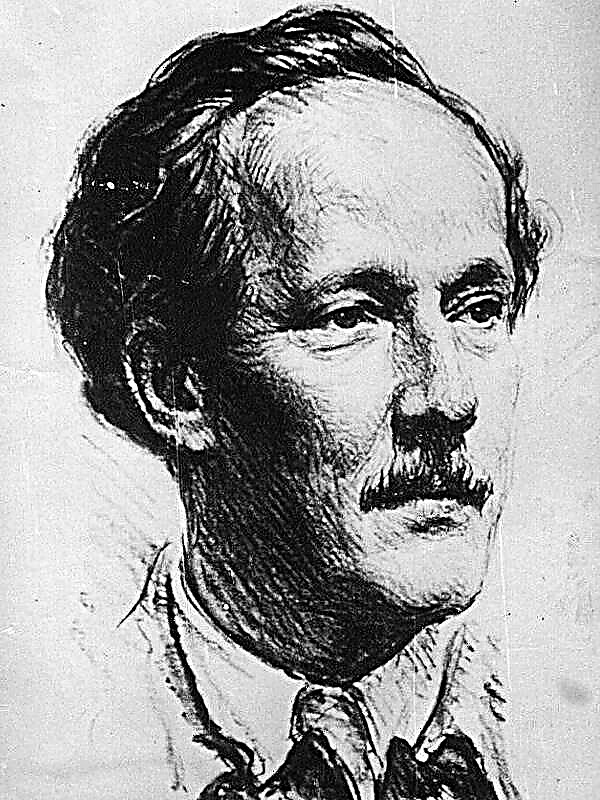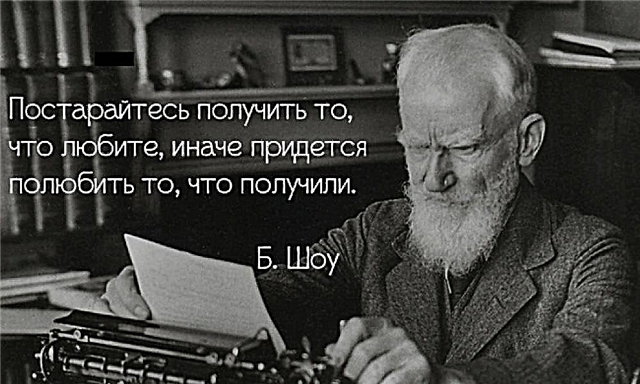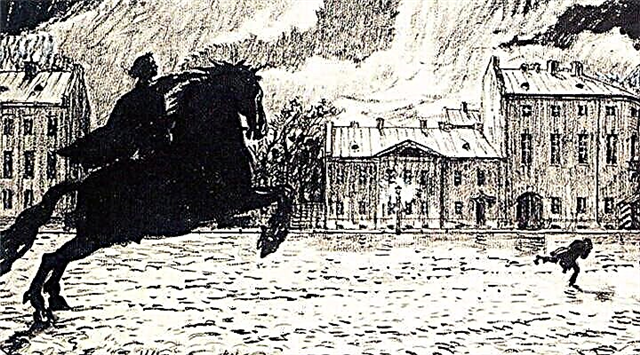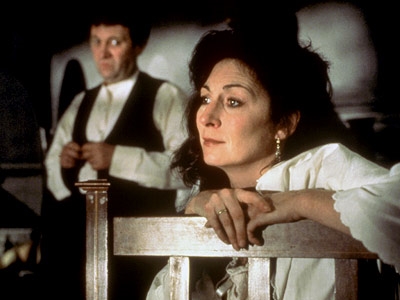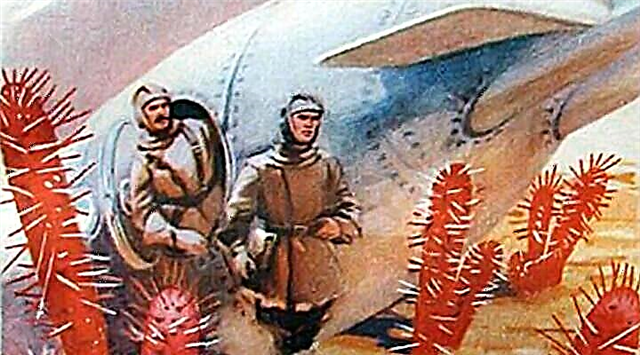The brilliant poetess Sappho, famous throughout Hellas, returns to his home from the Olympic competitions crowned with a laurel wreath. The people, servants and slaves with enthusiasm and glee, flowers and music meet their mistress. With a gold lyre in her hands, in festive attire, she descends from a chariot drawn by white horses. Beside her, no one knows, just dressed handsome young man with modest manners. Sappho presents it to his fellow citizens as her beloved, worthy person, noble family, with whom she wants to first know the joys of earthly life. From now on, the sounds of her lyre, which give people delight, will become more understandable and closer to them. A rich feast continues a happy meeting.
Left alone, Sappho and Faon reveal their feelings to each other. They have so much to say about themselves. For many years, the great Sappho suffered from treachery in friendship and love, she learned to endure resentment and loss alone. Now Sappho gives his heart full of incinerating passion to an unknown youth. She is tormented by fear, which may not be found in response to the same all-consuming love and tenderness. In Faon’s enthusiastic confessions, the insightful Sappho, the incomparable beauty Sappho with pain recognizes the familiar notes of flattery, veneration, deification, but not love in her earthly sense. Phaon feels completely happy. After all, the one admired by the whole ancient world, whose poems until recently had been reverently read from the scrolls in the family of Faon and among his friends, turned her supportive gaze on him. He was sent by his father to the competition of chariots to Olympia, but, obsessed with the desire to quickly see the divine Sappho, drove the horses, did not participate in games and did not receive awards. The best reward for him was the sight of the most beautiful woman. Excited about her victory, Sappho dropped the golden lyre, and Phaon rushed to her. Their eyes met, the fire in the eyes of the young man carried away the illustrious poetess, she called the embarrassed and silent Faon behind her, and he followed her.
Sappho understands that he is with his chosen one as if in different dimensions: she is on the cold peaks of art, where she was rewarded for the sacrifices made, for the “laborious feat of singing”; endowed with a beautiful appearance, high spirit, courage and the ability to be happy, he stands firmly on the earth. And this land and Sappho’s house on the seafront, surrounded by colonnades, grottoes and blooming roses, are so beautiful that it’s worth trying to combine yourselves with such different fates and enjoy a generous life:
“Let art drink from the cup of life, and life from the cup of bright art!” Sappho invites Phaon to own her house and slaves, to become their master and lord.
In the house of Sappho grew up her beloved slave, a young Melitta, a child kidnapped from her country and family. She was brought up by Sappho, grateful and devoted to her, she understands the complex character, the proud and easily vulnerable soul of her good mistress, surrounded by universal worship, but so incomprehensible and lonely. Sappho, in his own way, loves Melitta, considers her opinion. She wants to know what this girl thinks of Faun, so that together, as sisters, admire his virtues, dream of living together, when he begins to love both of them, albeit in different ways. Sappho does not know that Melitta also fell in love with Faon at first sight, hiding it from everyone and from herself. Sappho shares with Melitt his fears about how true and lasting the love of Phaon is for her, she suffers from the difference in age and life experience in their position. She needs Melitta's support. Such is Sapho’s constant state, hopes and joy alternating with doubts and fears.At first, Sappho only noticed Melitta’s passivity, a clear lack of any interest in the “master,” and a complete lack of understanding of the mistress’s feelings. It even calms her, she spares the soul of a young inexperienced girl.
Leaving the noisy feast, Phaon is in deep thought, in indecision. He feels remorse for his relatives, to whom he did not say anything about himself. Perhaps the Condemning Rumor had already informed them about the presence of his son with Sappho in the most unfavorable light for the poetess. Mentally Faon is ready to protect his goddess from all reproaches.
Longing for his family home and Melitta. She dreams of returning and crying on the chest of her relatives the anguish and pain of the slave, aggravated by the meeting with Faon, who should belong to the lady.
Young people happen to be nearby, alone. Faon noticed a beautiful girl during the feast. Melitta tells him the sad story of her life. As a sign of sympathy and friendship, the young man gives her a rose. Melitta wants to answer him the same, tries to pluck a rose from a tall bush, falls and falls into the arms of Faon, who quickly kisses her. At this moment, Sappho appears. Frustrated, she sends Melitt down and remains with Faon alone. The proud woman pretends to have taken the whole scene as a joke, and the embarrassed Faon agrees with her. Now Sappho expects words of love from him, but, not hearing them, seeks solitude.
After some time, exhausted by cruel doubts, Sappho sees Phaon falling asleep on a bench under a rose bush. This sight touches her, she is again ready to believe in his love, drives away thoughts of treason. Sappho kisses Faon's forehead, he wakes up and with half-closed eyes pronounces the name of the slave. Thus, the inexorable truth is revealed, which Sapho comprehends earlier than Phaon himself.
So, that which all Hellas is proud of is “put to shame by a slave.” No, she, the celestial woman, did not need to go down from her heights to mere mortals who could deceive, the "inheritance of the gods" cannot be confused with the "inheritance of the mortals."
The goddess arranges an interrogation of the slave, believing that she deliberately deceives her. She tries to rob Melitta of the rose that Faon gave her, threatening her dagger. Phaon runs to Melitta's cries. He accuses Sappho of cruelty and arrogance, calls it an "insidious Circe." Sappho is crying, shocked. Melitta pities her mistress, rushes to her, hugs her knees, offers to give both a rose and her life. But Phaon, having understood his feelings, becomes decisive. He leaves, taking Melitta with him.
Left alone, Sappho asks for help from the gods and curses the most terrible of human vices - ingratitude. She orders slave Ramnes to send Melitt across the sea, to Chios, to separate from Phaon.
This plan is violated by Faon, who himself, together with Melitt, leaves by boat in the sea. The girl can not resist her beloved, but does not feel the joy of running away, she is sorry for the lady.
Sappho sends the servants after the fugitives. She wants to look into Faon’s eyes and ask what she has blamed for; she still hopes to return his love. Lovers are returned by force. Confident of his rights as a free man, Faon also wants to look into Sappho’s eyes and understand her, to believe that she regrets and is ready to forgive. But she hides her eyes from Phaon. Melitta rushes to Sappho with a plea for forgiveness, as to a loving mother. But she abruptly turns away and leaves.
Phaon angrily expresses his contempt for Sappho, but receives a rebuke from Ramnes, who believes that a mere mortal does not dare to judge the “treasure of Hellas”, that love for the phaon has become the “only shadow” in the high and beautiful life of the poetess. And Melitta, in her sacrifice, is ready to become her slave again. Sappho appears, in rich clothes, with a purple robe on his shoulders, with a laurel wreath on his head, with a gold lyre in his hands - as when returning from the Olympics. Majestic and solemn, strong and wise - a completely different Sappho, who found herself, knows what to do. She appeals to the gods with a request to allow her to "end her life with dignity."Then he blesses the lovers as a mother and friend, and in front of them with an exclamation: “Immortals are honored, but they love only mortals!” - throws itself from a cliff into the sea. Great is the grief of those present. “She has now returned to heaven,” the words of Ramnes sound.


